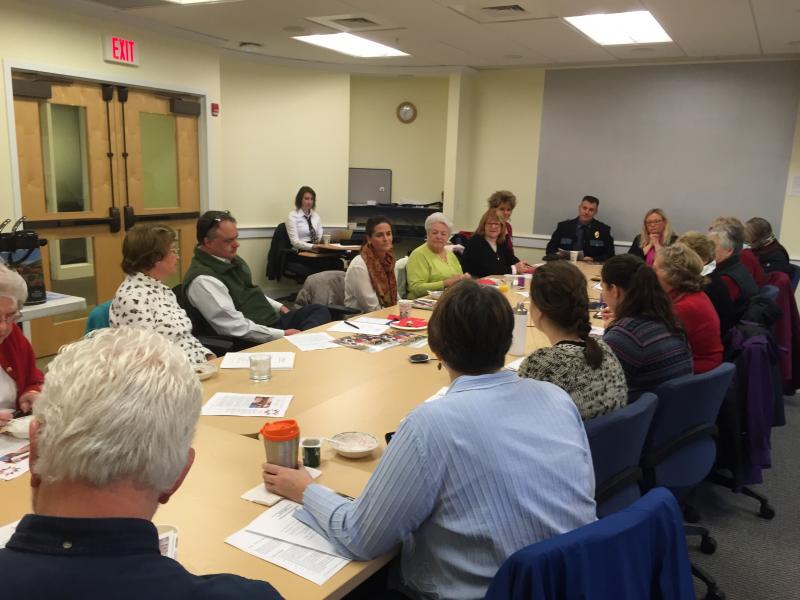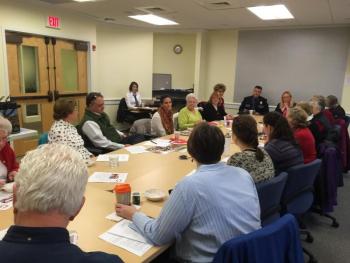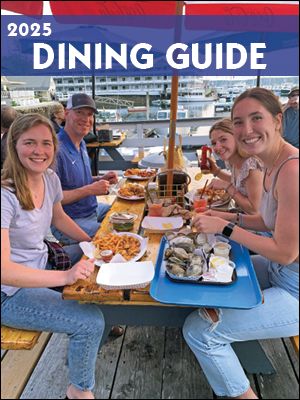Talking heroin in Boothbay Harbor
The statistics are grim and they are getting plenty of attention.
The U.S. Center for Disease Control reports that since 2000, the U.S. has seen a 200-percent increase in overdose death rates involving opioid pain relievers and heroin. In 2014, there were 28,647 opioid overdose deaths across the nation.
Maine hasn’t escaped this national trend; its statistics are equally troubling. In August, Gov. Paul LePage reported that heroin overdose deaths in Maine have risen from seven in 2011 to 57 in 2014. Last week, Maine Attorney General Janet Mills said Maine is currently averaging about five opioid-related overdose deaths a week. In the midst of this crisis, the CDC reported that Maine has the nation’s highest prescription rate for long-term, extended-release opiate medications.
Last week, the Lincoln County Healthcare community committee, which meets monthly at St. Andrews Family Care Center, heard from local and state professionals about Maine’s opiate epidemic and efforts to counter it.
Holly Stover, a community volunteer who works for the Maine Department of Health and Human Services, said the Boothbay region’s opiate addiction problem is as severe as in any Maine large city. “On a per capita basis our opiate addiction problem is as significant as Portland’s,” she said.
Stover said there was a clear link between prescription monitoring and the rise of heroin use. “It is not a surprise that when prescription opiates began to be controlled, we saw a surge in heroin. Drug dealers watch markets, too. It’s not a coincidence that we have seen a significant increase in heroin coming into the state.”
Boothbay’s Community Navigator Amy Winston has seen a big surge in heroin cases, Stover said. To help with the overwhelming workload due to the heroin problem, Stover said a new case management coordinator will be hired to work with Winston. Funds are available to help Boothbay region residents who need substance abuse treatment, Stover said. Winston can be reached at 207-350-6272 or brcrccommunitynavigator@gmail.com.
Boothbay Harbor Police Chief Bob Hasch, who has become a leader in helping addicts and linking community resources, said the local police department has become more proactive with helping drug addicts. “One thing I can do that the medical community can’t is reach out to people. We’re going out and pulling them over. We’re going to their homes and we’re providing them with information so they can get medical help, including basic health care.”
Hasch said he and other officers have been handing out CarePartners enrollment forms. CarePartners is a MaineHealth program that provides donated health care services for low-income, uninsured residents in Cumberland, Lincoln, Waldo and Kennebec counties. “These people don’t know what is available to them. It’s made me feel empowered to be able to help in this way. It’s been a great tool to have,” Hasch said.
Hasch believes the region and state need more beds to help those with substance abuse problems, but some addicts can benefit from outpatient therapy alone. Dr. Aqui Alamo, at the Family Care Center, is working with clinical social worker Lisa Carbone to offer integrated suboxone rehabilitation therapy, Hasch said.
“Dr. Alamo is one of a handful of people credentialed to prescribe suboxone. His program is really tight. One piece that is outstanding is you can’t get suboxone unless you commit to therapy with Lisa Carbone,” Stover said. She said Dr. Alamo’s suboxone patients are also referred to the community navigator for help and must commit to regular drug screening.
Stover added, “Some people need to get out of here. The drug community is so tight, sometimes to make it, they’ve got to break ties here.” For those, Stover said there are a variety of options, including PenBay Hospital and mental health crisis beds.
Sen. Chris Johnson said he has been working with Lincoln County’s law enforcement and medical community to get more local resources into communities. “Speaking with people who have been doing this successfully, they find the most important aspect of their program is also having an angel role. Someone who is like an AA sponsor; someone who will get you through detox, through your treatment. There’s a need for more resources and people who can help in those ways,” Johnson said. Johnson said his committee will meet next on Dec. 29 at 1 p.m. at the Damariscotta town office. The meeting is open to the public.
U.S. Sen. Angus King’s Senior Policy Adviser Marge Kilkelly described multiple approaches and areas of interest Sen. King is pursuing on the federal level to right the opiate addiction problem. Kilkelly’s list was long and detailed and included removing barriers to communication among caregivers, statewide roundtables focused on specific aspects of the opiate problem, opportunities to control prescription-related addiction, research into non-opioid pain relievers, increasing the number of suboxone providers and inpatient beds, investments in prevention and providing easier and better prescription disposal options.
“The tentacles of this are everywhere. My job right now is to try to figure where the connections are where one thing impedes something else,” Kilkelly said.
Event Date
Address
United States





























